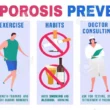Maintaining fitness and good health in your 40s is crucial for a happy and fulfilling life. However, as you age, your body undergoes changes, making it more challenging to sustain optimal fitness levels.
Nevertheless, it is never too late to initiate healthy lifestyle changes and reap the benefits of a healthy body and mind.
In this blog, we will explore some effective tips and strategies to help you stay fit in your 40s and beyond.
Stay Active
Remaining physically active is one of the most important steps you can take to stay fit in your 40s. Regular exercise not only helps in weight management but also reduces the risk of chronic diseases such as diabetes, heart disease, and certain cancers.
Aim for a minimum of 150 minutes of moderate-intensity exercise or 75 minutes of vigorous-intensity exercise each week.
Focus on Strength Training
Strength training assumes particular importance in your 40s as it helps maintain muscle mass, which typically declines with age.
Regular strength training can also improve bone density, which decreases with age and can lead to osteoporosis.
Strive to engage in strength training activities at least two to three times a week, targeting major muscle groups such as the legs, back, chest, and arms.
Also read: Exercises for Knee Pain Relief: Improve Mobility and Flexibility
Prioritize Flexibility and Mobility
As you age, joint stiffness tends to increase, making movement more challenging. Incorporating regular stretching and mobility exercises into your routine can help maintain joint flexibility and prevent injuries.
Include stretching exercises in your daily regimen and consider adopting activities like yoga or Pilates, which enhance flexibility, balance, and coordination.
Watch Your Diet
Diet plays a pivotal role in maintaining overall health and fitness. In your 40s, it is important to consume a well-balanced diet rich in whole foods such as fruits, vegetables, lean proteins, and whole grains.
Limit your intake of processed foods, saturated fats, and sugars, as they can contribute to weight gain and other health issues.
Get Adequate Sleep
Adequate sleep is essential for overall health and well-being. Getting between seven to nine hours of sleep each night can boost energy levels, reduce stress, and enhance your immune system.
Establish a regular sleep routine and prioritize sufficient, high-quality sleep.
Manage Stress
While stress is a normal part of life, chronic stress can have a detrimental impact on your health and well-being. In your 40s, it is important to adopt healthy stress management techniques, such as exercise, meditation, or spending time with loved ones.
Incorporating stress management practices into your daily routine can help you remain calm and focused.






